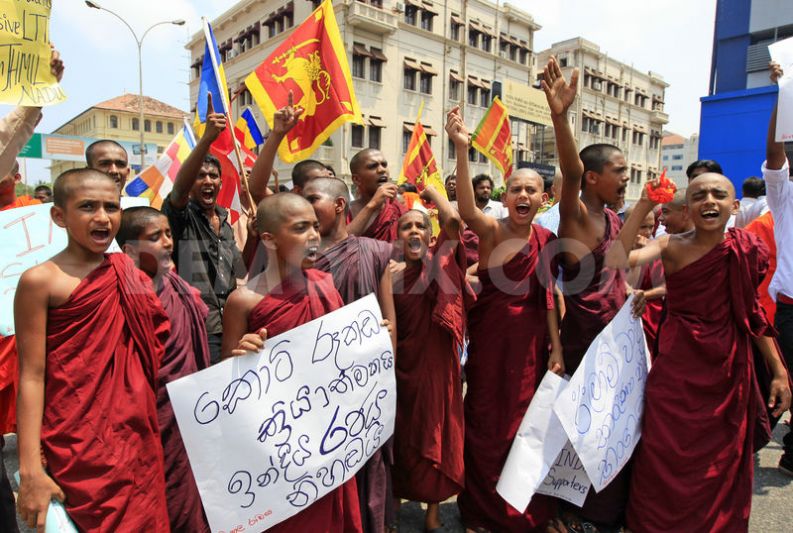 * In Myanmar, at least 300 Rohingya Muslims, whose ancestors were migrants from Bangladesh, have been killed and up to 300,000 displaced, according to Genocide Watch. Ashin Wirathu, a monk who describes himself as the Burmese “bin Laden,” is encouraging the violence by viewing the Rohingya presence as a Muslim “invasion.”* And in Buddhist-majority Thailand, at least 5,000 people have died in Muslim-Buddhist violence in the country’s South. The country’s Knowing Buddha Foundation is not a violent group, but it advocates for a blashemy law to punish anyone who offends the faith. It wants Buddhism declared the state religion and portrays popular culture as a threat to believers.
* In Myanmar, at least 300 Rohingya Muslims, whose ancestors were migrants from Bangladesh, have been killed and up to 300,000 displaced, according to Genocide Watch. Ashin Wirathu, a monk who describes himself as the Burmese “bin Laden,” is encouraging the violence by viewing the Rohingya presence as a Muslim “invasion.”* And in Buddhist-majority Thailand, at least 5,000 people have died in Muslim-Buddhist violence in the country’s South. The country’s Knowing Buddha Foundation is not a violent group, but it advocates for a blashemy law to punish anyone who offends the faith. It wants Buddhism declared the state religion and portrays popular culture as a threat to believers.
Though fundamentalism is a term that has thus far been used mostly in relation to Christianity, Islam and Hinduism, some are beginning to use it to describe Buddhists as well.
Maung Zarni, an exiled Burmese who has written extensively on the ongoing violence in Myanmar and Sri Lanka, argues that there is no room for fundamentalism in Buddhism.
“No Buddhist can be nationalistic,” said Zarni, a visiting fellow at the London School of Economics. “There is no country for Buddhists. I mean, no such thing as ‘me,’ ‘my’ community, ‘my’ country, ‘my’ race or even ‘my’ faith.”
He views the demand for an anti-blasphemy law in Thailand also as a distortion of Buddhism, which doesn’t allow any “organization that polices or regulates the faithful’s behavior or inner thoughts.”
But Acharawadee Wongsakon, the Buddhist teacher who founded the Knowing Buddha Foundation, insists Buddhism needs legal protections and society must follow certain prescribed do’s and don’ts.
She and others see the new movements as providing “true knowledge on Buddhism.”
Thailand’s conflict between Muslim insurgents and local Buddhists, which reignited along the Malaysian border in 2004, is part of a long-standing feud pitting Buddhist monks and Muslim insurgents.
“For sure, Thailand has its own brand of ‘Buddhist’ racism towards non-Buddhists,” said Zarni. “But, I am not sure the Thai society will go the way of those two genocidal Theravada Buddhist societies (Sri Lanka and Myanmar) — where racism of genocidal nature has enveloped the mainstream ‘Buddhist’ society.”
Buddhist monk Phramaha Boonchuay Doojai, a senior lecturer at Chiang Mai Buddhist College in Thailand, said there are reasons why Theravada Buddhists see Islam as a threat. Among them, he cited the destruction of Nalanda University in India by Turkic military general Bakhtiyar Khilji in the early 13th century and attacks on Buddha statues in Bamiyan, Afghanistan, around the seventh century and more recently by the Taliban in 2001.
“Thousands of monks were burned alive and thousands beheaded as Khilji tried his best to uproot Buddhism,” he said.
Zarni agrees there are links “among what I really call anti-Dharma ‘Buddhist’ networks” in Sri Lanka, Myanmar and Thailand, which are “toxic, cancerous and deeply harmful to all humans anywhere.”
Wirathu was recently labeled on the cover of Time magazine as “The Face of Buddhist Terror.” The Myanmar government banned the edition. But Wirathu was quoted telling a reporter, “I am proud to be called a radical Buddhist.”